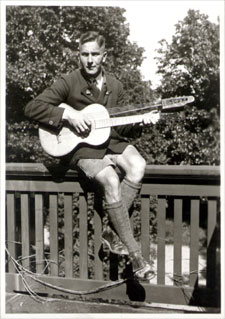Student Days and Vicarage
Karl Steinbauer studied theology at the universities in Erlangen, Tübingen and Königsberg from 1927 to 1931. At the beginning of his undergraduate studies, he joined the Germania dueling fraternity at the university in Erlangen and remained loyal to it until the end of his life. He attended the courses of Karl Heim (1874–1958), Karl Fezer (1891–1960), Julius Schniewind (1883–1948) and Hans Joachim Iwand (1899–1966) but his teachers of theology impressed him little. Looking back, Steinbauer opined that none of his professors had influenced him decisively.
Instead, Steinbauer’s theology was shaped by Karl Barth (1886–1968), whom he did not meet personally during his days as an undergraduate. The traditional formation by Luther, reaching back to Steinbauer’s childhood, and his intensive study of the Bible remained crucial to his theology. Luther’s exegesis of the 82nd Psalm calling upon the duly called clergy of the church to criticize the governing authorities if necessary took on particular importance for Steinbauer. He passed his first theological exam in 1931 and became a vicar in Heiligenstadt near Bamberg.
Steinbauer underwent a crucial change of political views in 1932. Still a candidate for membership in the NSDAP in 1931, he announced he was leaving the party one year later. His change of views was triggered by the so-called Potempa Murder. Storm Troopers had kicked a Communist to death before the eyes of his mother on August 10, 1932 in Potempa near Beuthen. Hitler had shown solidarity with the culprits when they were sentenced to death for this murder, portrayed them as freedom fighters and announced their release. Hitler’s conduct prompted Steinbauer and other Protestant theologians to turn away from the NSDAP categorically.
Source / title
- © Private collection of Elisabeth Giesen, née Steinbauer, Cologne

